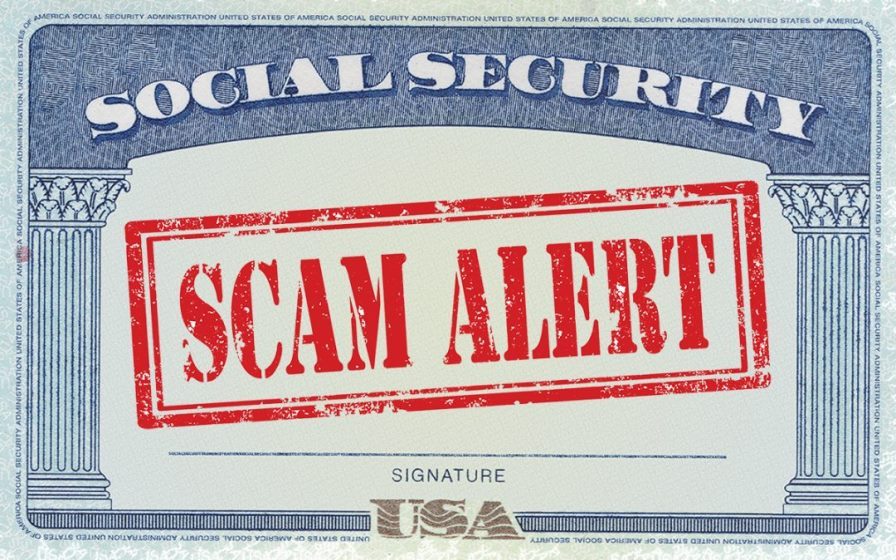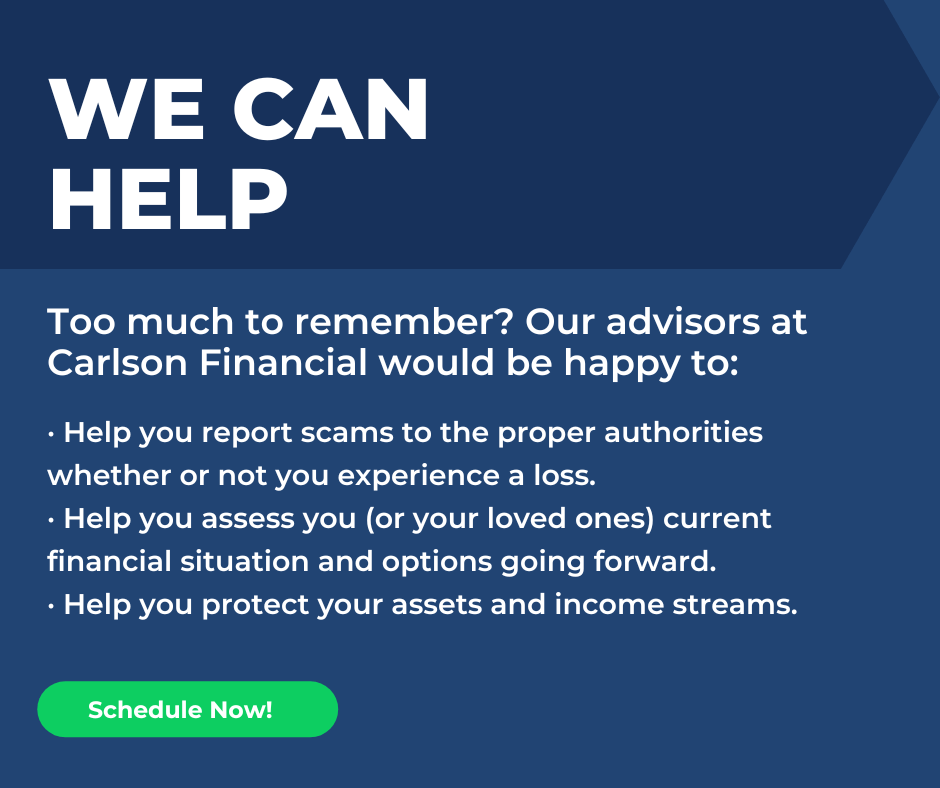Protecting Yourself From Social Security Fraud
Written By: A. Suzanne Robertson, CFP®

The phone rings. Caller ID says it’s the local police. Concerned, you answer. On the line is a voice claiming to be with the Social Security Administration calling to advise that your social security number has been compromised and multiple bank accounts tied to drug cartels have been opened in your name. The IRS is getting ready to seize your legitimate account and you are in danger of being arrested for money laundering unless you follow their instructions. The caller tells you they work for the government and normally would never tell you to how to hide your money from the police or the IRS, but they just can’t stand to see people lose their life savings to overreaching government officials especially when they know you are innocent. If you follow their instructions, they can help you stay out of jail and keep access to your money so that you can pay your bills and hopefully not lose your house. They proceed to tell you your social security number has been suspended so you’ll need to apply for a new one. They then stay on the phone with you to walk you through the application. Now that they’ve gathered all of your personal information, they instruct you to withdraw all of your money from your bank accounts and purchase gift cards. They tell you not to tell anyone what’s going on because it’s highly confidential and you’ll both get in trouble if their boss finds out what they’re doing for you. They say “Don’t worry, as soon as you get everything worked out, [they’ll] help you cash the cards out and put the funds back into a new bank account in your name.” Meanwhile, you need to register each of the cards you purchased. They help you do that too and ask you to read them the serial numbers. If at any point you hesitate to answer their questions or try to get off the phone politely, they threaten you with arrest or loss of your life savings, so you comply. Congratulations. You just became a victim of Social Security Fraud.
Sadly, hardly a day goes by that we don’t hear one of these stories. In the best scenarios, the intended victim either recognized the red flags and hung up or only gave away a small portion of their savings. In the worst of cases, the victim is left destitute and reliant on public assistance, friends, and/or family to support them. It isn’t a situation any of us want to be in or a feeling we want to have.
One of our clients took a call just like the one above while she was sitting in our office last year. Fortunately, we were there to stop her from falling prey and help her report it to the proper authorities. In 2021, the Social Security Administration received over 500,000 reports of social security-related fraud totaling more than $63 million in losses to victims. With approximately $46 million in losses reported by the 2nd quarter, things aren’t looking any better for 2022. Compounding the problem, thieves are becoming more and more sophisticated in their attempts. They set up phones numbers with caller IDs spoofing local police departments, or in the case of my client, the Social Security Administration. They check websites and get names of individuals they impersonate, so their lies are getting more and more believable – especially when there’s a flood of adrenaline swamping the victim’s brain because they think their social security number was compromised and they’re about to be charged with money laundering. So, what can you do to protect yourself?
First, stop and take a breath. Recognize the red flags and remember who you are speaking with. Facts to remember:
- The Social Security Administration does not and will not “suspend” Social Security numbers.
- Legitimate government officials and or law enforcement do not and will not ask for payment in the form of gift cards.
- If you DO owe money to the IRS or the Social Security Administration, they will not call you. They will send you a letter telling what you owe, why you owe it, present your payment options, and advise you of your rights to appeal.
Realizing this, what should you do when you receive a call of this nature? Hang up. Even if you truly believe the call might be legitimate, do not share any personal information. Instead, ask them for a number where you can call them back, then hang up. Report all suspicious calls.
Unfortunately, Social Security fraud covers only a small fraction of the swindles facing Americans today. There are schemes to steal your houses and cars (google “Title Fraud”), Pyramid schemes – does the name Bernie Madoff ring a bell?, IRS fraud where nefarious individuals pose as IRS agents, website misdirection sometimes called “Spoofing” where you try to go to one website retailer like Amazon but are unknowingly redirected to a fraudulent site, phishing schemes where you receive a fraudulent e-mail tricking you into entering in personal data and giving away passwords, charity fraud where someone pretends to represent a reputable charity or tricks you into donating to a non-existent one, identity theft, and countless others. Indeed, the Federal Trade Commission reported Americans lost $5.1 Billion – that is BILLION with a B – to fraud in 2021 alone. As I said before, callers can be very sophisticated. They may have researched you and they may know things about you like your address or your relative’s name. Honestly, I’ve known financial professionals who were conned by convincing callers or e-mails. The problem is so prevalent that many financial firms, including Carlson Financial, have rules requiring advisors to actually speak to a client before sending any money even to known accounts. Regardless of what they tell you, do not give any strange or unknown callers information about yourself or your assets without speaking to a trusted advisor first. If you DO forget and share your information, first and foremost, don’t be embarrassed or afraid to tell someone what happened and what information you shared. It may help you to write down what you remember then contact your state’s Consumer Protection Office right away. Law enforcement can’t help you if they don’t know you’re a victim and it’s easy to forget important facts in the heat of the moment.
As fiduciaries, Carlson Financial works hard to look out for our clients, but there is only so much we can do. Yes, we can stop the crimes that occur when you happen to be sitting in front of us, but we need you to be diligent as well. It’s a horrible feeling to look someone in the face and tell them they’ve lost their life’s savings and all we can do now is help them report the crime, help them find ways to cut expenses, wish them good luck, and direct them to the Department of Social Services apply for public assistance.
Have you been the victim of fraud? If so, please report it whether or not you experienced a loss.
Start by contacting your state’s Consumer Protection Office. Click this link to find the contact information for your state: State Consumer Protection Offices | USAGov
Next report it to the proper federal agency. Instructions to report scams or fraud can be found at Report Scams and Frauds | USAGov along with links to the various agencies where you’ll need to report them.
Most types of fraud should be reported to the Federal Trade Commission either online at ReportFraud.ftc.govor by phone at 1-877-382-4357
Report fake websites, emails, malware, and other internet scams to the Internet Crime Complaint Center at Internet Crime Complaint Center(IC3) | File a Complaint. (There are also links to report threats of terrorism to the FBI or complaints for the National Center for Missing and Exploited Children on this page).
If you know or believe it is an internationally-based operation, you should report it online to the International Consumer Protection and Enforcement Network ateconsumer.gov: econsumer – Report international scams online!
Social security-related fraud should be reported by using Social Security’s online form found at https://secure.ssa.gov/ipff/home.
Identity theft and tax related fraud including IRS imposters should be reported to the US Treasury Inspector General for Tax Administration either online at Hotline | U.S. Treasury Inspector General for Tax Administration OIG (tigta.gov) or by phone at 1-800-366-4484.

If you have any questions, we’d love to chat! Call us at 844-CARLSON (844-227-5766) today!
Get on our email list to receive these updates in your inbox!
Ready to Take The Next Step?
For more information about any of the products and services listed here, schedule a free assessment today or register to attend a seminar.
